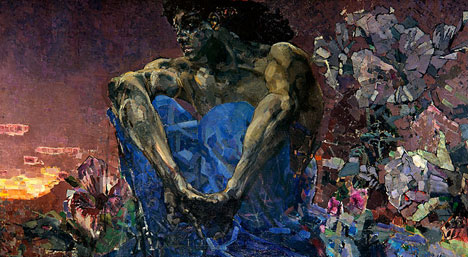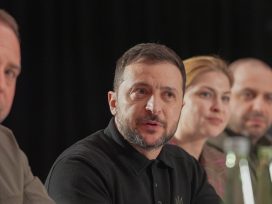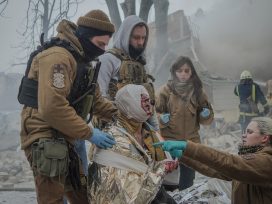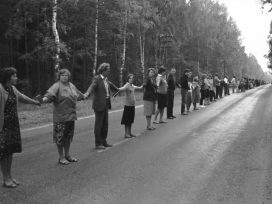Twenty-five years after the USSR’s collapse, writes Maria Stepanova, history has turned into a kind of minefield, a realm of constant, traumatic revision. As a result, Russia is living in a schizoid present where the urgent need for a new language is far from being met.
Many observers have been puzzled and fascinated by the strange metamorphoses Russia and the country’s social consciousness have undergone over the past fifteen years. What has happened over the past three or four years in particular has been impossible to ignore. These changes have to be viewed within the wider, global context in which they have occurred. However, that doesn’t make what is happening in Russia less grotesque nor does it make the regression that has marked every aspect of Russia’s cultural and social life – from medicine and education, through human rights to the press that no longer fulfils its role, turning increasingly into a propaganda mouthpiece – any less spectacular. Nevertheless, the global context has to be taken into account.
The debate about the end of history started quite a while ago. There is, however, some difference between “the end of history” as originally understood by Alexander Kojève – who sees the ideal state as a machine that satisfies its citizens in so many different ways as to render history as a movement or progression unnecessary – and the situation we are experiencing at present, when every possible idea concerning the future arouses fear, tension and concern.

, Mikhail Vrubel, 1890, oil on canvas, 114 x 211 cm. Source:Wikimedia
It is a rather alarming sign that the culture of modernity in which we live has been marked by a fear and distrust of the future. For one of the fundamental ideas of modernity has been a sustained effort to change our lives, gradually arriving at something “new”, in the sense of “better”. In fact, for the past two centuries, progress has been a key word. Lately, however, the idea of creating something new not as a tool, but as a point of reference, something that is worth aiming for, has been disappearing from our horizon.
Since sometime in the late 1980s, the history of mankind has for the first time in a long while stopped being understood as a history of progress. Until then the future was seen, metaphorically speaking, in terms of the vision of the Strugatsky brothers, that is, a future in which wonderful, advanced people live in a society that is virtually perfect, solving technical problems and correcting the mistakes of parallel universes. But at some point, around the time of the collapse of the Soviet Union and fall of the Berlin Wall, the only imaginable version of the future that remained was a dystopian one, which had to be avoided at all cost. It would be interesting to discover the exact point at which utopian thinking turned dystopian, when history started to accelerate. So what happened in popular culture at this time?
For a relatively short period, the future was still seen through rose-coloured glasses, as a consumerist paradise in which the idea of progress was linked exclusively to changes in the technical aspects of life, with the future seen as a “technically improved” present. A striking example of this trend in popular culture is the Back to the Future trilogy, which paints an identical picture of the present, the past and the future, except that the future boasts useful inventions such as flying sneakers. From the late 1990s onwards, many Hollywood films presented a dystopian future where only a few survive. It is a future from which one wants to flee.
What is it that terrifies us about the prospect of history, of being caught in history? The twentieth century has demonstrated all too clearly where progress leads. And given that there is no prospect of improvement and that things can only get worse, a standstill or stasis becomes the desired state of affairs. And that makes the current situation seem acceptable.
In this way a substitution takes place by means of signing a covert social contract – we are prepared to consider our imperfect state acceptable as long as things don’t get worse. The first example that comes to mind is the covert deal Vladimir Putin made with Russian society in the early noughties. Although the conditions of this deal weren’t made explicit until later, they were acknowledged quite early, in 2002 and 2003, that is, at a time when it would have been sensible to protest. Yet mass protests didn’t materialize for another decade. In exchange for private freedom society gave the government a virtually unlimited freedom to act. So, in effect, the future was, rather misguidedly, exchanged for the present. This consensus continued until the events of late 2011.
The acceptance of the present, and the fear that what is to come can only be worse still, are quite universal but there is something specific about their Russian manifestation: I would suggest that in addition to the fear of the future, which is quite widespread, Russia is living in a schizoid present. Over the past year I, like many others, have tried to venture on the precarious pathway of historical analogies, spending a lot of time reading diaries and notebooks of Alexander Blok that have suddenly acquired a new relevance in trying to understand what is happening in Russia today. For example, the picture emerging from the following quote, from a letter the poet wrote in November 1909, seems eerily recognizable today: “Nowadays a ‘solid order’ has quite definitely and undoubtedly been imposed on Russia, and as a result Russia’s inhabitants have found themselves with their hands and feet tightly bound – everyone individually and all together. The only effect one can achieve by any kind of active move (in any sphere of life) is to inflict pain on one’s neighbour who is bound just as tightly as oneself. These are the circumstances of our social, state and private lives. […] Everything is equally fetid, dirty and suffocating – as it has always been in Russia: we have hardly known any history, art, events or anything that provides a unified foundation for all life. No wonder that there is no life either.”
But for its historical backdrop this dark quotation might easily apply to our present-day reality. The early years of the past century were set against the backdrop of a heightened, tense anticipation of changes, wishing for some calamity that would accelerate the advent of these changes, a kind of invocation of the future. This is not just Blok’s poetic image – in those years this was literally the air Russia was breathing: the wish to change the present, the existing order of things at any cost. Because the present was so bad that any turn of events would be better than what existed.
Our common experience of the Soviet past has taught us that reality can be changed. It has also shown that the change can turn out to be terrible. I recently read an article written by a psychoanalyst who has analysed a wide range of patients over the last 20 years. She has detected certain regularities in their accounts of their dreams. One quite typical dream seems to explain a great deal about our present sensitivities. A young woman dreams that a recently passed law requires that everyone who has lost their passport face the firing squad. In her dream she loses her passport and while her entire family is shocked, her mother says: “Don’t worry, I don’t believe you’ll be executed, you’ll just be sent into exile.” And lo and behold, the police come to get her; her weeping mother packs her suitcase; she travels in a cattle train bound for Siberia and as the train passes the silent white expanses outside, the thought goes through her head “Jesus, I’ve always known this would happen, that all my life has been just an illusion, a semblance, that it wasn’t going to last forever. I’ve always known this is what I was born for.”
This is just one of hundreds of similar dreams. Two characteristics stand out: a profound distrust of the very fabric of reality and what it is made of: reality is perceived as an illusion that can be swept away with the slightest of efforts, exposing its truly monstrous mechanism. The other feature is a deep distrust of the mother figure, whether interpreted as actual mother or the motherland. Without a murmur, even perhaps with a certain enthusiasm, both family and motherland will give you up, to be digested by this monstrous machinery. And this is one of the basic laws on which our reality is founded.
The key to these stories lies not in the present but in the past. That is to say, all the fears and premonitions that we project into the future relate, in one way or another, to the past, as it is seen as the only code we have for trying to understand the future. But at the same time, we lack knowledge of the past. Instead, we have merely a selection of images that illustrate our past.
It seems to me that over the 25 years that have passed since the collapse of the USSR, the notion of history as a realm that is subject to constant review has firmly taken root. There are some historical explanations for this – for example, Soviet historiography was understood as a scholarly monologue that the state construed and envisioned literally on the hoof, in line with immediate demand. As a result of these manipulations, Soviet historiography quite rapidly reached the conclusion that it is always the winners who are in charge of history. This process resulted in a profound distrust of official historiography, sociology and statistics. It also launched an almost invisible current of “small” history running parallel with official history, a pulsating stream of oral, underground family narrative that ran counter to official history. In the early 1990s, this narrative erupted to the surface and at that moment there was a chance for these two currents of history to merge and produce something new. However, instead of one supplanting the other or the two merging to create something new, the two narratives continued to exist as two parallel texts. As a result, the past has become open to interpretation, something that can be read in any number of ways. This became particularly apparent in the Putin era as a deliberate effort was made to dismantle expertise as an institution. There are many examples of this phenomenon but the selection of people appearing on federal TV channels illustrates it well. These days any conspiracy theorist can be plucked from the street and declared an expert on any issue simply because his or her view of current affairs happens to correspond to the political demands of the day. These people are instantly dubbed experts, and they stay on air for a few weeks before being dismissed and sent back to the streets to ply their conspiracy theory trade.
These parallel tiers of interpreting history, not connected by staircases and intended for different target groups, have turned history into a kind of minefield, a realm of constant, traumatic revision. It means that today no social consensus exists with regard to virtually any key moment of our history. There is no consensus over Peter I, the 1917 Revolution, Stalin or Khrushchev; indeed, there is no agreement even about Rurik. Every time a crucial point of our history is discussed it provokes furious debate which won’t die down and allow us to draw a line under it once and for all.
In psychoanalytical terms our relation to history could be described as a failed process of separation. It might be imagined that it would be quite easy to initiate this process of separation simply by acknowledging what we have been through. For without this acknowledgment historical reality cannot really exist, it is interchangeable and, what is even more serious, history in Russia stops being an exact science and instead turns into pure fiction. In essence, in present-day Russia the realm of history has become the realm of literature. And the dangers this entails have become obvious quite recently, after the first tentative push for the future provided by the Bolotnaya Square protests.
Following the laws of physics, Putin’s government gave a symmetrical response to this push for the future, by pushing for the past in return, and building a multilevel construction with a single aim – that of maintaining the status quo. Putin’s regime has not yet acquired the desired state of stasis: it is just trying to freeze, it is still heterogeneous, lumpy, its structure still complex. The features of this construction can be described by looking at its façade, namely the language of official journalism.
The first feature of this is hybridity. The language of the Russian mass media is a scrappy quilt, an ideological patchwork that facilitates quick response. That is to say, these days we employ the stylistic devices of the 1970s Soviet press sprinkled with individual idiomatic expressions, terms and constructions borrowed from 1930s German propaganda. Only a day later the official media might switch to using 1960s language studded with 1920s clichés. Entire stylistic layers are being employed but the key element is the infinite fluidity, depending on what is required at any particular moment.
The second feature is the appropriation of imported language, applied without regard for the original context and meaning. There are plenty of examples – “enemies of the people”, “Banderovtsy” to cite just a few. Or Putin tearfully quotes Lermontov, clearly without understanding the structure of the poem quoted and having forgotten what it is about. That is to say, the quote is used as a text that exists independently of its original context. Any similar attempts to present Brodsky and Mandelshtam as imperial poets are doomed to fail a priori. However, nobody is interested in long-term success, what matters is the immediate reaction. They are just formulae, quickly used up and discarded just as quickly.
The third feature is pragmatism: the lack of a properly articulated ideology makes it possible to adapt flexibly to any given circumstance. For example, the Komsomolskaya Pravda journalist Ulyana Skobeyda might wax lyrical about Stalin every two months, only to pen an indignant piece soon afterwards about liberals threatening to unleash a repeat of the 1937 terror. The fact that Stalin and 1937 exist within the same metaphorical bracket is ignored because historical reality is just a bank of examples to be freely dipped into for the purpose of illustrating a column.
The fourth feature is “simulacrity”, in other words a fallacious reliance on tradition that, under the slightest scrutiny, turns out to be just a function invented to suit the need of the moment. [Putin’s] “spiritual staples”, whether diving for amphorae or invoking the ancient Chersonese, are just some of the tropes that fit into this category. The same principle applies to newspaper articles that imitate the aggressive propaganda of the 1930s, though lacking its lethal force. Back then, an editorial in the weekly Literaturnaya Gazeta most likely meant arrest whereas nowadays this kind of article doesn’t mean anything. It is just a style register journalists use as they see fit.
And, last but not least, an unexpectedly judgmental feature, which I regard as extraordinarily important in this context. It is lying. When there are no verified facts and no experts who can assess what is going on, the door opens to negating reality as such. This means that truth and lies, good and evil, black and white no longer seem to exist. They become infinitely interchangeable, blurred in what is essentially an artistic pursuit. It has often been noted that one of the key invariables of pro-Putin rhetoric and the official media can be summed up by the adage “we are all tarred with the same brush”. The point is not to whitewash or justify one’s own actions but rather to point out that everyone does the same. “We are no better that the others but we are no worse either.” In this sense the very issue of ethics as such, of the legitimacy of the Russian regime’s actions, becomes a moot point. Perceiving reality merely as a fiction enables us to disregard ethical judgement and the existence of truth, and worry only about the momentary impact and immediate persuasiveness of the immediate utterance. Tomorrow’s truth easily supplants the truth of today and the truth of the day after tomorrow replaces that of tomorrow. Today we say there are no Russian troops in Crimea and three months later we describe in detail the exact way the military operation was carried out and who exactly was involved in it. And these two statements in their completely primeval innocence co-exist in the same information space, without negating or changing anything.
What matters is that all these truths and untruths use yesterday’s language. And that, I would say, is the main problem Russian society faces today on every level. Putin’s regime and the opposition both face the same problem, as does – with particular urgency – the intellectual community. And while the regime, fixated on its own preservation, stays within the remit of its own logic, and opposition reacts to the agenda dictated by the regime, it is the job of intellectuals to try and think outside the box.
The very descriptive language we use, the very models we turn to in order to discuss the present, the very need to constantly correlate our experience with hundred-year-old patterns demonstrates that, to a degree, we regard the present as secondary, as existing as merely one precedent among many others, whose number can swell ad infinitum. This means that the present lacks identity and uniqueness and it also means, to some extent, that the present will arrive only once a language for it has emerged.
Obviously, in this state of constant sensory and verbal imprecision, we need some navigation, something to help us find our bearings in the terrain. But constantly trying to seek historical parallels creates a false cartography because the terrain has changed and so have the people who inhabit it. These parallels are more likely to obscure the picture even further or, to change the metaphor, to immerse us in a sea of connotations so deep as to make reality even less discernible than it was before. We have been “catapulted” into the present, yet we are incapable of describing it without resorting to quotations and imprecise analogies. And this is the main issue and challenge to be resolved. I, for one, don’t have a solution. But I feel it is important to state this and to put our joint intellectual machinery into action in search of a new language.
And there is one more crucial thing. At some point Russia became a point of repulsion for Ukraine, propelling it in another direction. It is a great gift to be able to define one’s own outlines, to acquire one’s own identity with the help of a powerful accelerator, which is the wish to be different. However we may end up – bad or poor – what matters is that we won’t be the same as you. Russia’s big problem is that it has nothing to push off from. She can only run from herself, lacking as she does a notion of something different she needs to escape from. It seems to me that our unburied, unreconciled, undismissed past, which keeps dragging us back, could become that other thing for us. The present can’t start speaking its own language unless we part with this past.
Published 18 January 2016
Original in Russian
Translated by
Julia Sherwood
First published by Eurozine (English version)
Contributed by Transit © Maria Stepanova / Transit / Eurozine
PDF/PRINTPublished in
In collaboration with
In focal points
Newsletter
Subscribe to know what’s worth thinking about.
Related Articles

The ‘Trump–Putin deal’ again places Ukrainians in a subaltern role. The leaked contract with its fantasy $500 billion ‘payback’ has been compared to Versailles, but the US betrayal recalls nothing so much as Molotov–Ribbentrop.

Ukraine faces its greatest diplomatic challenge yet, as the Trump administration succumbs to disinformation and blames them for the Russian aggression. How can they navigate the storm?






